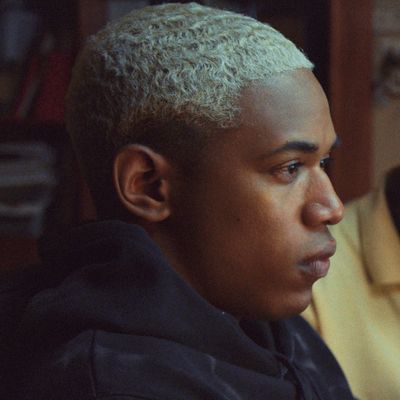
One of the threads that can be traced through this season of serious cinema is driving. I don’t mean in the Ford v Ferrari sense, though cars obviously loom very large in any racing movie — I’m talking about driving in the roll-down-the-window-and-turn-your-music-up sense, driving as enabler of a kind of everyday transcendence. It’s there in the way that Cliff Booth and Sharon Tate cruise around 1969 Los Angeles in Once Upon a Time in Hollywood, turning the city as seen through their windshields into their own ongoing private screening. It proves key to Melina Matsoukas’s upcoming Queen & Slim, which is as much a road movie as it is about two strangers forced to go on the run. And it’s an ecstatic sensation that feels like it might be the guiding force behind the South Florida family drama Waves, the third film from writer-director Trey Edward Shults. It kicks off with two of its characters screaming along to Animal Collective as they head down an overpass, limbs poking out of the car like wings, utterly enraptured with one another.
Waves is not a musical by any standard definition, though a “dramatic musical” was what it was initially, and confusingly, billed as, possibly because it’s not easy to describe. It’s about the Williams siblings — cocky high-school senior Tyler (Kelvin Harrison Jr.) and his withdrawn younger sister Emily (Taylor Russell) — with the film split in two parts, bifurcated by a tragedy. While characters don’t break into song the way they would in a musical, it’s unusually carried by music, with an incredible, near wall-to-wall soundtrack that blends with a score from Trent Reznor and Atticus Ross. Those songs — by Tame Impala, Kendrick Lamar, Frank Ocean, and, in a key moment, Kanye West — are essential to the driving sequences that make up the best, lushest parts of the movie, the ones where it feels like the film could lift off the ground and fly away. Shults and his cinematographer Drew Daniels put their camera on an axis in the center of their vehicles, and have it spin in ways that are disorienting in the film’s first half, centered on Tyler, and dreamier in the second, which focuses on Emily.
Shults, who’s 31, made his debut in 2015 with the incredible family drama–as–horror story Krisha, before moving on to the somehow-less-scary post-apocalyptic thriller It Comes at Night two years later. He’s part of A24’s stable of wunderkinds, and he definitely knows how to throw a camera around — that opening shot of Tyler and his girlfriend Alexis (Alexa Demie) in the car kicks off a montage of Tyler’s life as a popular kid and star of the wrestling team that’s dazzling and dizzying in its constant forward motion. Waves is Shults’s most ambitious movie, and what it makes clear is that, as a director, he has talent and style to burn, but when it comes to writing, he’s on less sure footing. That’s especially evident in the first half, which delves into Tyler’s deceptively fragile self-image as the star of his school, and of his household — the 18-year-old clearly commands the lion’s share of parental attention, as his stepmother Catharine (Renée Elise Goldsberry) dotes, and his self-made father Ronald (Sterling K. Brown) constantly pushes.
Then a serious shoulder injury, an unexpected pregnancy, and an inability to talk about his feelings send Tyler spiraling out of control and into a scenario that feels like the world’s most gorgeously shot after-school special. The sensory overload of being in Tyler’s head doesn’t counter the exasperating turns the film takes, from the character’s escalating pill-popping to the way his underwritten girlfriend gets turned into an albatross around his neck. When it all culminates in an incident that will surprise no one, it’s a relief in part because the film has become so claustrophobic, and in part because Emily’s half of the story is allowed to unfold more organically. Alone, her life derailed by what’s happened, she finds solace in a sweet relationship with a classmate named Luke (Lucas Hedges), eventually accompanying him to reconcile with his dying father, reconciling with her own feelings in the process. Hedges does his regular thing, embodying an idea of masculinity that stands in contrast to the toxic one portrayed in the movie’s beginnings. But it’s Russell, with her small, sad face, who’s the standout, doing such delicate work in the wake of the film’s first half, that it can feel like you have to lean in to hear her with your ears still ringing.
Waves is, like Shults’s first (and still best) film Krisha, semi-autobiographical in its themes, though it seems fair to guess that Shults’s teenage experiences didn’t exactly mirror Tyler’s. Shults didn’t grow up as part of a middle-class black family, though he has spoken about collaborating with Harrison, who appeared in It Comes at Night, after deciding to cast the actor in his new project. If the film feels like it shortchanges the Williams family in any way, it’s in how it doesn’t entirely feel like there’s a solidity to their history as a family and as individuals, especially with regard to the hard-fought upward mobility that Ronald holds so dear. It will feel intensely grounded in their experiences in some moments, and then it will skim over others in ways that come across as careless. They don’t feel like black characters grafted onto roles that were initially conceived of as white, but they don’t always feel entirely formed either, an impression that’s not helped by the choice to keep the siblings in largely separated narratives.
Maybe one of the reasons the driving sequences feel so striking in Waves is that they’re instances in which the film is freed from the inconvenient burdens of character and story to just summon emotion — something Shults, in those scenes, is awfully good at.


